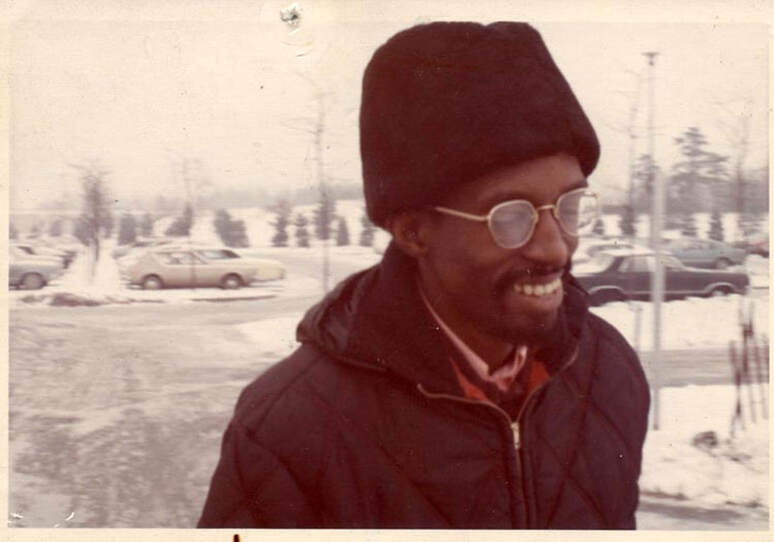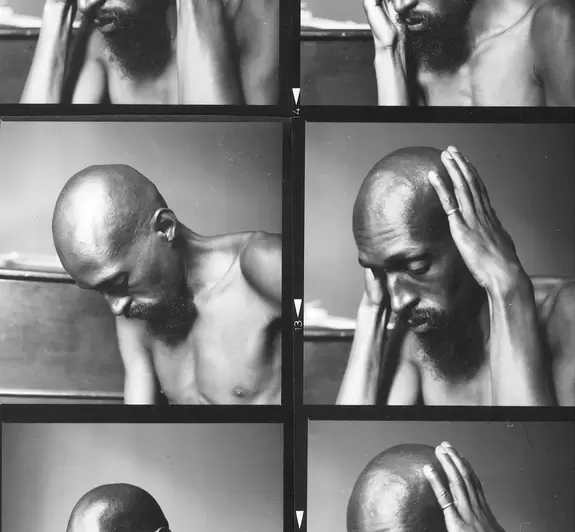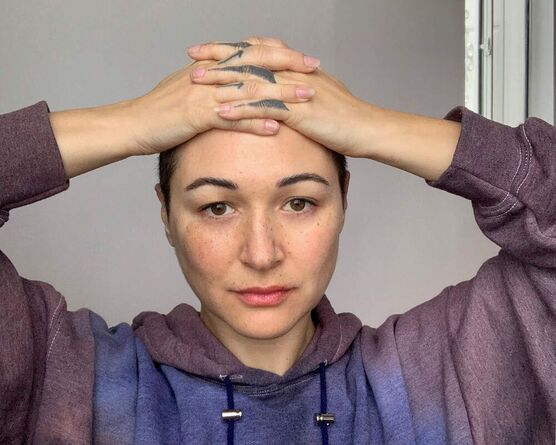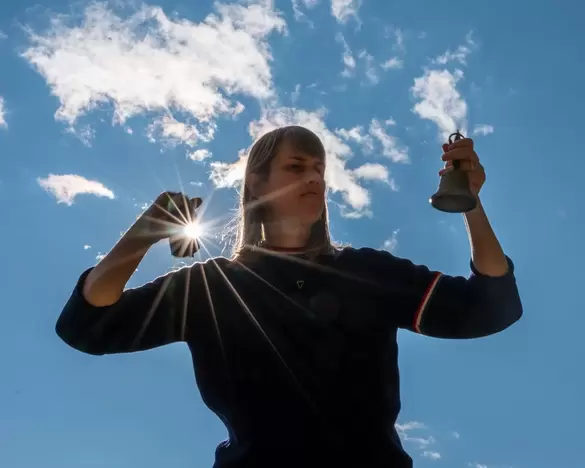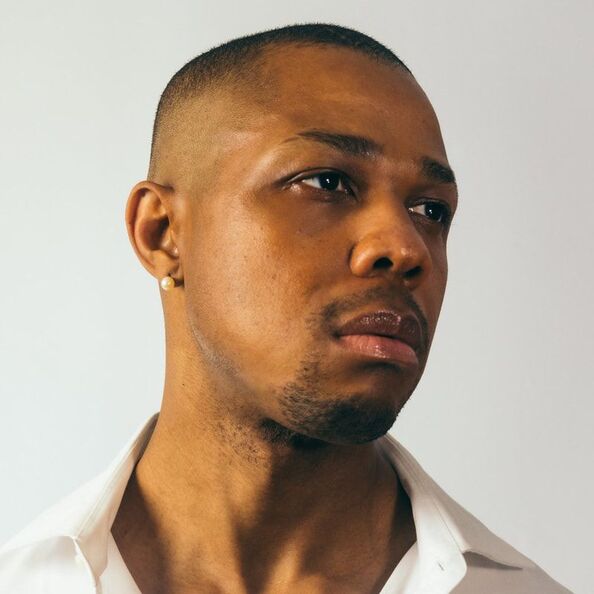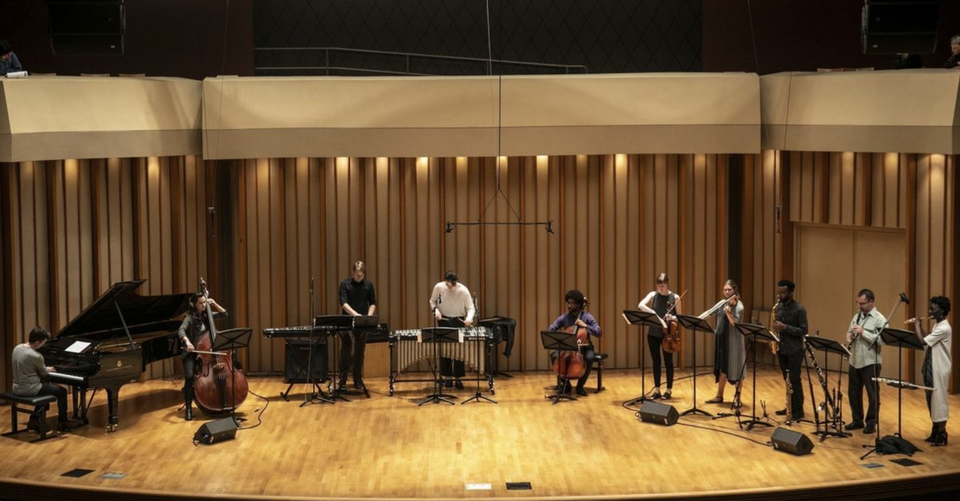JULIUS EASTMAN :
(MASCULINE) / (FEMENINE)
A LOST WORK REIMAGINED
APRIL 29 and APRIL 30, 2023 | GETTY CENTER
1200 GETTY CENTER DR, LOS ANGELES, CA 90049
1200 GETTY CENTER DR, LOS ANGELES, CA 90049
PERFORMANCES OF JULIUS EASTMAN'S 1974 MASTERWORK 'FEMENINE' ALONGSIDE NEWLY
COMMISSIONED WORKS BY SARAH HENNIES, DAVÓNE TINES and JJKA*
Free Events. General admission. Reservation Required.
*JJKA is an ensemble comprised of sound artists Jacqueline Kiyomi Gork, Jonathan Mandabach, Kumi James, and Ashland Mines
COMMISSIONED WORKS BY SARAH HENNIES, DAVÓNE TINES and JJKA*
Free Events. General admission. Reservation Required.
*JJKA is an ensemble comprised of sound artists Jacqueline Kiyomi Gork, Jonathan Mandabach, Kumi James, and Ashland Mines
RSVP using the links above. Type in the date or dates you would like to attend
and match your reservation with the time of the performance.
Both performances of these works will last approximately 70 minutes and will be
performed simultaneously across different locations on the Getty Center campus.
* JJKA is Jacqueline Kiyomi Gork, Jonathan Mandabach, Kumi James, and Ashland Mines
The performances of Julius Eastman's 'FEMENINE' and Sarah Hennies' 'MASCULINE' will be performed by ECHOI.
For Jacqueline Kiyomi Gork's 'MASCULINE,' the artist will be joined by Kumi James (BAE BAE), Jonathan Mandabach and special guests.
For Davóne Tines' 'MASCULINE,' the work will be performed by the artist himself.
For Jacqueline Kiyomi Gork's 'MASCULINE,' the artist will be joined by Kumi James (BAE BAE), Jonathan Mandabach and special guests.
For Davóne Tines' 'MASCULINE,' the work will be performed by the artist himself.
|
A LOST WORK REIMAGINED:
A CONSTELLATION OF POSSIBLE MASCULINES In 1975, the composer Julius Eastman presented two works on a single program at the Albright-Knox Art Gallery in Buffalo, New York: one was titled FEMENINE and the other MASCULINE. Interestingly, instead of presenting the two works on successive halves of this program, Eastman presented both works simultaneously in different locations on the Albright-Knox campus. Thus, the audience was forced to make a choice: Do they listen only to FEMENINE? Do they listen only to MASCULINE? Or do they oscillate freely between the two performances? Or could they somehow position themselves to listen to both works equally?
These questions that Eastman thrust upon the audience were not only musical, they were both prescient and philosophical. What does it mean to be feminine? What does it mean to be masculine? Can one be one today and another tomorrow? Can one be both simultaneously? Can one be neither? Are these qualities separable? Or do they in fact contain each other? And finally: how can these constructs be expressed as music? To the best of anyone's knowledge, FEMENINE was the work composed first. Around the date of its completion, the work was performed several times. At its premiere, Eastman reportedly played piano wearing a dress. However, following this initial flurry of performances, FEMENINE was forgotten and, until recently, not revisited. Fortunately, both a manuscript and a recording of FEMENINE survived, and within the past five years, the piece has heroically re-emerged, becoming widely recognized as a masterwork with frequent performances around the globe. MASCULINE, on the other hand, did not receive such a charmed fate; to this day, neither a score nor a recording survives. Not so much as a fragment of manuscript, nor an anecdote from a colleague has surfaced, thus leaving a tragic and poetically charged void where MASCULINE once was. Which brings us to our present project: instead of seeing MASCULINE's absence as an obstacle, we have decided to see it as a blank canvas for a new generation of artists — each deeply schooled in the lineage of Julius Eastman — to meditate, express and respond. The world has changed so much in the nearly fifty years since the composition of MASCULINE and FEMENINE. Eastman's attitudes about race, gender, and sexuality have been vindicated in so many ways. Julius Eastman is the prism, and we have asked a new generation of artists to refract their own energies and ideas through him. For this project, we have invited three artists — Jacqueline Kiyomi Gork, Sarah Hennies and Davóne Tines — to create works in the chasm left by MASCULINE's absence. The works are not re-creations, but rather, re-imaginings. Recalling that extraordinary day in 1974 at the Albright-Knox, we will perform these works simultaneously with FEMENINE, using the Getty's expansive campus as our grounds for experimentation. We are thrilled about this project and can't wait to share it with you. Post-Script: Monday Evening Concerts wishes to say THANK YOU to the many tireless and selfless scholars behind the scenes in the Julius Eastman renaissance. To all of you, we would like to express our gratitude for making our work possible. |
This project is co-produced by Monday Evening Concerts and Getty Museum Public Programs. Made possible by Getty Museum.
ABOUT THE ARTISTS
JULIUS EASTMAN
Julius Eastman (1940–1990) was a composer, conductor, singer, pianist, and choreographer. A singular figure in New York City's downtown scene of the 1970s and 80s, he also performed at Lincoln Center with Pierre Boulez and the New York Philharmonic, and recorded music by Arthur Russell, Morton Feldman, Peter Maxwell Davies, and Meredith Monk. “What I am trying to achieve is to be what I am to the fullest," he said in 1976. "Black to the fullest, a musician to the fullest, a homosexual to the fullest.”
Despite his prominence in the artistic and musical community in New York, Eastman died in obscurity in Buffalo, NY. His death went unreported for eight months, until an obituary by Kyle Gann appeared in the Village Voice. Eastman left behind few scores and recordings, and his music lay dormant for decades until a three-CD set of his compositions titled Unjust Malaise was issued in 2005 by New World Records. In the years since, there has been a steady increase in attention paid to his music and life, punctuated by newly found recordings and manuscripts, worldwide performances and new arrangements of his surviving works, and rising interest from choreographers, scholars, educators, and journalists. "The brazen and brilliant music of Julius Eastman…commands attention: wild, grand, delirious, demonic, an uncontainable personality surging into sound," writes Alex Ross for The New Yorker.
Despite his prominence in the artistic and musical community in New York, Eastman died in obscurity in Buffalo, NY. His death went unreported for eight months, until an obituary by Kyle Gann appeared in the Village Voice. Eastman left behind few scores and recordings, and his music lay dormant for decades until a three-CD set of his compositions titled Unjust Malaise was issued in 2005 by New World Records. In the years since, there has been a steady increase in attention paid to his music and life, punctuated by newly found recordings and manuscripts, worldwide performances and new arrangements of his surviving works, and rising interest from choreographers, scholars, educators, and journalists. "The brazen and brilliant music of Julius Eastman…commands attention: wild, grand, delirious, demonic, an uncontainable personality surging into sound," writes Alex Ross for The New Yorker.
JACQUELINE KIYOMI GORK
Jacqueline Kiyomi Gork has been working with the intersection of sound, sculpture, and performance since 2002. She studied sound art, photography, and new genres at the San Francisco Art Institute and researched the history of communication technologies, acoustics, and computer music at Stanford University. Her work has been exhibited at major institutions including Made in L.A.: A Version, Hammer Museum, Los Angeles; Sculpture Center, New York; San Francisco Museum of Modern Art, San Francisco; V-A-C Foundation, Moscow, as well as 356 Mission Rd. and Human Resources, both in Los Angeles. Her work is currently on view at the Institute of Contemporary Art, Los Angeles. She is represented by François Ghebaly, Los Angeles and Empty Gallery, Hong Kong.
SARAH HENNIES
Sarah Hennies is a composer based in upstate New York whose work is concerned with a variety of musical, sociopolitical, and psychological issues including queer & trans identity, psychoacoustics, and the social and neurological conditions underlying creative thought. She is primarily a composer of acoustic ensemble music, but is also active in improvisation, film, and performance art. She presents her work internationally as both a composer and percussionist with notable performances at MoMA PS1, New York; Monday Evening Concerts, Los Angeles; Le Guess Who, Utrecht; Festival Cable, Nantes; and the Edition Festival, Stockholm. Sarah is currently a Visiting Assistant Professor of Music at Bard College.
DAVÓNE TINES
Davóne Tines, heralded as a “singer of immense power and fervor” and “[one] of the most powerful voices of our time” by the Los Angeles Times, is a pathbreaking artist whose work encompasses a diverse repertoire, ranging from early music to new commissions by leading composers, and explores the social issues of today. A creator, curator, and performer at the intersection of many histories, cultures, and aesthetics, he is engaged in work that blends opera, art song, contemporary classical, spirituals, gospel, and protest songs as a means to tell a deeply personal story of perseverance connecting to all of humanity. Tines is a winner of the 2020 Sphinx Medal of Excellence, recognizing extraordinary classical musicians of color. He also received the 2018 Emerging Artists Award from Lincoln Center for the Performing Arts and is a graduate of Harvard University and The Juilliard School.
ECHOI
ECHOI is a flexible chamber ensemble that serves as the ensemble-in-residence of Monday Evening Concerts. It was originally founded by Jonathan Hepfer and Alice Teyssier in Oberlin in 2006 as an autonomous group in the tradition of eighth blackbird and the International Contemporary Ensemble. For about a decade, the group's existence was nomadic, giving concerts at SUNY Buffalo, UC-San Diego, the MehrKlang Festival (Freiburg, Germany), Musica Sacra (Maastricht, Netherlands), and the Universities of Huddersfield, Minnesota and Leeds.
Since 2015, the ensemble has been based in Los Angeles, where it has grown roots, performing at venues such as Hauser & Wirth, the Getty Museum, LAXART and Zipper Hall. Recent projects have included Julius Eastman's Femenine, Holy Presence of Joan d'Arc, Gay Guerrilla and Crazy N, Steve Reich's Drumming and Music for 18 Musicians, Sarah Hennies' Contralto, Pierre Boulez's sur Incises, Yves Klein's Monotone Symphony, John Cage's Speech, Salvatore Sciarrino's Aspern Suite, and Gérard Grisey's Quatre chants pour franchir le seuil.
Since 2015, the ensemble has been based in Los Angeles, where it has grown roots, performing at venues such as Hauser & Wirth, the Getty Museum, LAXART and Zipper Hall. Recent projects have included Julius Eastman's Femenine, Holy Presence of Joan d'Arc, Gay Guerrilla and Crazy N, Steve Reich's Drumming and Music for 18 Musicians, Sarah Hennies' Contralto, Pierre Boulez's sur Incises, Yves Klein's Monotone Symphony, John Cage's Speech, Salvatore Sciarrino's Aspern Suite, and Gérard Grisey's Quatre chants pour franchir le seuil.
